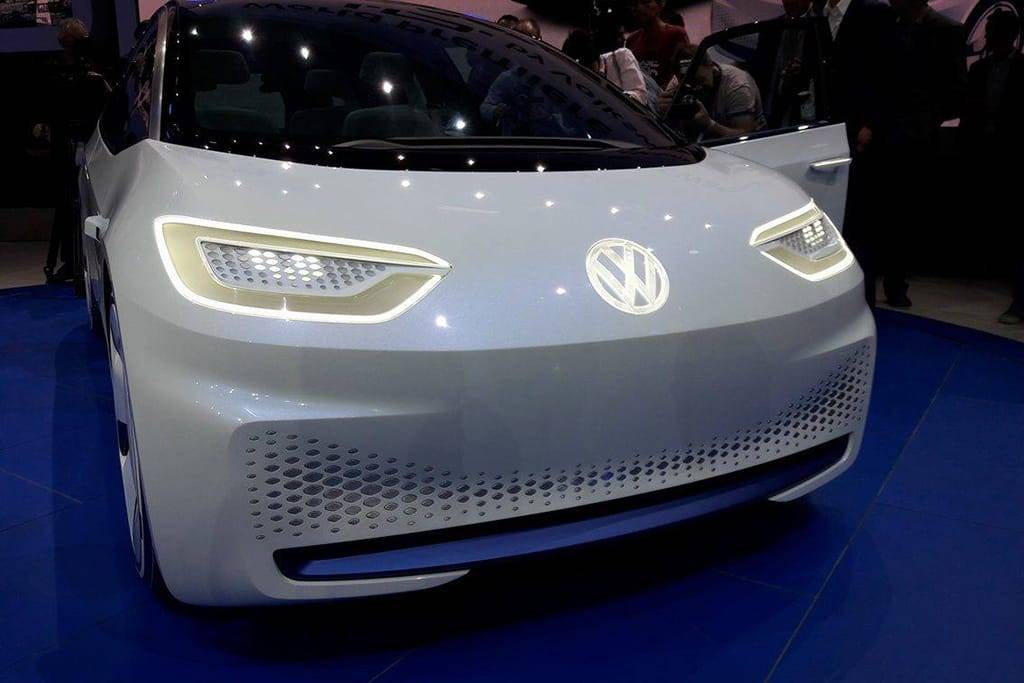VW Boss Puts Tesla on Notice

CARS.COM — “Anything Tesla can do, we can surpass.” That statement, reported in the Financial Times, was said by none other than Volkswagen’s brand chief, Herbert Diess, during a recent company meeting detailing the German automaker’s ambitions to become a leader in electric vehicles.
Diess’ statement doesn’t leave much room for interpretation. In even blunter terms, VW wants to wrest away Tesla’s unofficial title as the tech-savvy darling of the EV world.
Related: Volkswagen: Hello New Jetta, Bye-Bye Beetle?
By 2025, VW is targeting annual sales of a million electric vehicles globally. For comparison, Tesla sold approximately 76,000 vehicles last year, while total production of the Model S sedan and Model X crossover topped 83,000 units.
Diess was particularly no-nonsense when it came to discussing Tesla’s move toward the mainstream with the summer arrival of the $35,000 Model 3 sedan. According to Diess, it’s VW’s intention to “stop them there, to rein them in,” when it comes to Tesla treading into a much wider (and more affordable) segment of the car market. Right now, the cheapest Tesla models have an MSRP hovering around $70,000.
Tesla intends on starting Model 3 production in July, with the factory ramping up toward an annual production rate of 500,000 per year. There is already a lengthy waiting list of approximately 400,000 people who intend to buy one.
Why Should I Care? VW is looking to steer the conversation away from its diesel scandal by throwing the EV gauntlet down to Tesla. The interesting thing is that VW appears to be ignoring the fact that other industry heavyweights are also committed to electric cars — companies of a similar size and scale like GM, Hyundai, Toyota, BMW and Mercedes-Benz.
Picking on Tesla makes sense primarily because the Silicon Valley-based car company is good at garnering headlines. Elon Musk, Tesla’s ambitious and outspoken CEO, prefers to make bold statements via his Twitter feed while shunning the typical product reveal format of other car companies at major auto shows around the world.
Yes, Tesla hopes to more than quadruple its yearly sales in the near future, but even the projected annual rate of 500,000 Model 3 sales represents a drop in the bucket compared to VW’s true rivals. For example, Toyota sold nearly 10.2 million vehicles worldwide in 2016 as it fought a close battle with VW for the title of “world’s biggest automaker.” GM came in third place, with global sales of approximately 9.6 million vehicles.
So VW is worried about Tesla, a company that didn’t even exist 15 years ago?
VW’s intention to become a leader in the realm of EVs is still commendable, especially when viewed from an environmental standpoint and as a counter to the subterfuge the automaker committed with its diesel model. VW’s recent concept cars — such as the I.D. hatchback and I.D. Buzz minivan — have highlighted the flexibility of its upcoming MQB platform, which will underpin a wide range of electric-powered cars, vans and SUVs over the coming years. Pushing more into the realm of zero-emission vehicles is a good move for VW, so long as it understands other companies of equal size are going to shove back, too.
Uber Self-Driving Car Research Migrates to Canada
Uber is heading northward as its self-driving car research team opens a branch in Toronto. This marks the first time Uber has conducted autonomous vehicle research and development outside of the U.S. The Canadian team will be led by Raquel Urtason, a specialist in the field of artificial intelligence and machine perception. In Uber’s press release, Urtason’s primary responsibility will be helping autonomous vehicles to “see” their surroundings, to learn how to navigate their way through highly unpredictable driving situations.
The Toronto-based Uber team will not be tasked with the actual build of self-driving vehicles nor real-world usage of them (like Uber’s use of Ford Fusion self-driving sedans in Pittsburgh, for instance). Instead, the Canadian team’s task is to develop systems to allow autonomous vehicles to learn and understand their environment, to make them smarter and quicker to adapt.
Why Should I Care? Uber is branching out into untapped markets in the field of self-driving car research. Directly linking itself to a new and highly skilled workforce is a smart move, especially as Silicon Valley experiences a veritable bidding war for talented engineers in the field of automobiles and artificial intelligence. As car companies and technology firms scramble to develop smarter vehicles, the pool of talent in established automotive hubs (Detroit) and tech markets (San Francisco) is getting progressively smaller.
This news also allows Uber a moment of calm as the company endures an ongoing legal battle with Waymo, Google’s self-driving car research division, over whether Uber might have profited from stolen technology secrets. The former head of Uber’s Advanced Technology Group, Anthony Levandowski, is accused of pilfering thousands of documents before leaving Waymo to start his own self-drive research firm, called Otto. After only six months, Otto was purchased by Uber for some $680 million and Levandowski was brought onboard to spearhead the ride-hailing company’s autonomous vehicle research division.
Featured stories




